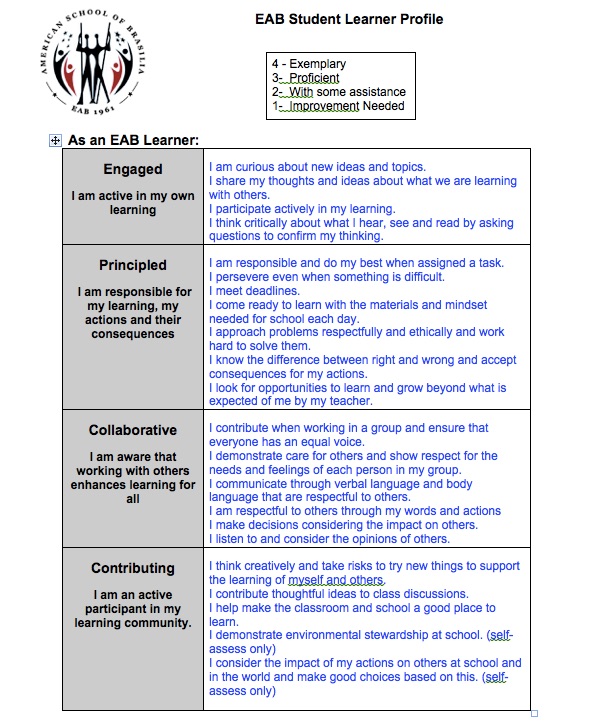“Use your unique gifts and talents to make a difference in the world.” Lailah Gifty Akita.
After a yearlong review process, involving regular feedback and contributions from parents, students, and teachers through surveys, retreats, and focus group meetings, the American School of Brasilia’s new mission statement was officially introduced at the start of this school year:
Learners inspiring learners to be inquisitive in life, principled in character, and bold in vision.
As part of an ongoing analysis of EAB’s new mission statement, this week’s post looks at the fourth and final element of the mission: Bold in Vision.
Bold in Vision highlights the aspiration that our students and community members will make a positive difference in our community and the greater world around them. In one sense, Bold in Vision is the outcome that brings the other elements of the mission together towards a higher aim. While it is imperative to support and empower a community of learners to inspire each other and foster a lifelong love for learning (Inquisitive in Life), knowledge and learning can be further enhanced in the context of values systems (Principled in Character). Taking this progression a step further, it seems to be a loss if all of this learning and character development are not applied in some manner to improve, not only ourselves, but our communities and the lives of others.
To further the goal of making a positive difference, the Bold in Vision aspect of the mission also focuses on the strategic approaches to implementing effective change. These strategic changes and the ability to effectively address many of our current challenges will require creative and innovative approaches. To that end, our schools must assume the fundamental responsibility towards ensuring learning environments that support creativity, innovation, empowerment, and engaged learning.
In his book, From Master Teacher to Master Learner, Will Richardson highlights this responsibility of schools, with a particular focus on the role of teachers:
“Our job as educators is to understand deeply what it means to be a modern learner more so than a modern teacher. Our goal should not be to learn new technologies in order to become better teachers in the traditional sense. Our goal is to develop expertise in powerful new technologies to become better learners for ourselves and for our students, who may lack other learning models.”
It is hoped that EAB’s new mission statement embodies the ideals associated with Richardson’s words.
As with any focus on a Bold in Vision statement, technology will play a key role in the future of education. The Organization for Economic Co-operation and Development (OECD) published a report in 2015 entitled, Students, Computers, and Learning: Making the Connection, which frames the role that technology will play in education. Specifically, the report stresses that, “information and communication technology (ICT) has revolutionized virtually every aspect of our life and work. Students unable to navigate through a complex digital landscape will no longer be able to participate fully in the economic, social, and cultural life around them.”
The work of teachers is key to leveraging the opportunities associated with ICT. However, the report cautions that, “technology can amplify great teaching but great technology cannot replace poor teaching.” This is an important quote in that it clarifies that technology is not driving our work nor replacing poor teaching but rather providing teachers with an additional, important, and ubiquitous resource to support the learning process.
Finally, when considering our commitment to the Bold in Vision aspect of our mission statement, the OECD report emphasis the role of schools and educators on the future of learning:
“We need to get this right in order to provide educators with learning environments that support 21st century pedagogies and provide children with the 21st-century skills they need to succeed in tomorrow’s world. Technology is the only way to dramatically expand access to knowledge. Why should students be limited to a textbook that was printed two years ago, and maybe designed ten years ago, when they could have access to the world’s best and most up-to-date textbook? Equally important, technology allows teachers and students to access specialized materials well beyond textbooks, in multiple formats, with little time and space constraints.”
Returning to EAB’s new mission statement, the last element of the mission – Bold in Vision – was purposely designed to be less prescriptive and focused as compared to the other elements of the mission. The reason for this design is to frame the American School of Brasilia’s future work in the context of dynamic and changing environments. Bold in Vision is an open-ended premise that challenges us to use our collective learning and development to make a positive difference in the world through personalized, innovative, and creative approaches.
Learners inspiring learners to be inquisitive in life, principled in character, and bold in vision.
Previous Posts about Mission Statement:
Featured image: cc licensed (CC BY-NC-SA 2.0) flickr photo by Chase Elliott Clark (Binoculars V) https://www.flickr.com/photos/chasblackman/8502151556/



